Our Roots Are Still Alive - Chapter 7
Previous: Chapter 6
Table of Contents
Next: Chapter 8
New Jersey Solidarity-Activists for the Liberation of Palestine Main Site
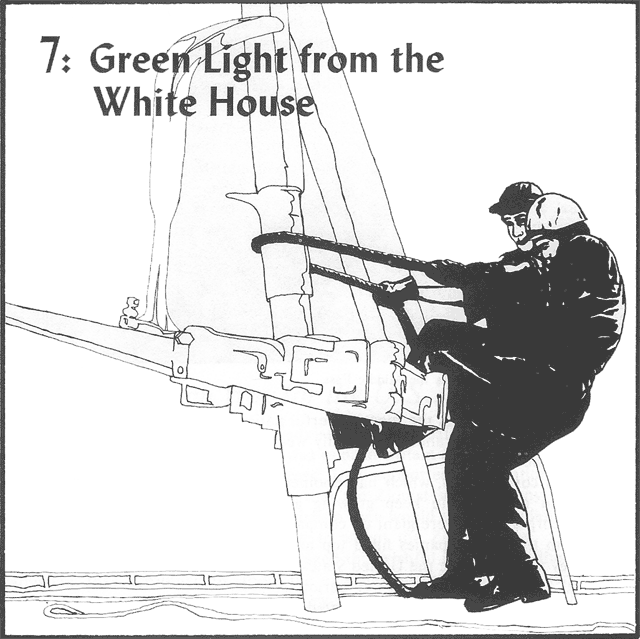
- SAUDI ARABIA: "Where the oil resources constitute a stupendous source of power and one of he greatest material prizes in history
- State Department Memo to Truman, 1945
On April 12, 1945, the death of Franklin Roosevelt propelled Harry Truman into the White House. A few days after Truman's inauguration, the new President prepared for a visit from American Zionist leader Rabbi Stephen Wise. Presidential advisers gave Truman a hasty briefing on U.S. policy toward the Middle East. They explained the promises Roosevelt had showered on Arab and Zionist alike. The contradictory promises had a single purpose: to secure allies for an American drive into the Middle East.
Truman listened intently. Like most members of Congress, he had endorsed Zionism while he was a United States Senator. As a shrewd politician and an unelected President, he appreciated the vote-getting potential of his support for the Jewish state. But as President, he had to weigh more important considerations - for example, what the oil companies wanted in the Middle East. The United States was emerging from the war as the most powerful nation in the world. The old colonial empires of Britain and France were fatally weakened. The era of U.S. imperialism's supremacy had begun.
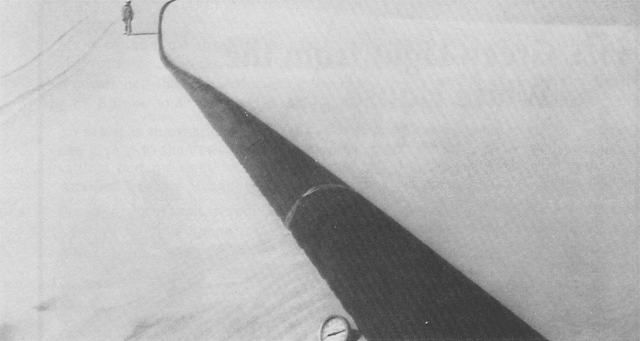 U.S. oil companies' pipelines crisscross the Middle East.
U.S. oil companies' pipelines crisscross the Middle East.
American corporations, which had boomed in the war economy, needed global markets and resources to keep growing after the war. Three of the top five American corporations were giant oil companies involved in the Middle East. Personnel from the oil companies filled top posts in the State Department and Pentagon. They wanted to see the United States control the Middle East and its oil, the most vital resource of the post-war period.
In the 1930s Britain had dominated Middle Eastern oil. American corporations then controlled less than 10 percent of the area's known oil reserves, mostly in Saudi Arabia. The discovery of vast new reserves in Saudi Arabia at the outbreak of the war increased the U.S. stake in the area. From the start, competition between the United States and Britain for Middle Eastern oil had broken into open conflict. But the United States had gained the upper hand. In the course of the war, Britain had gone deeply in debt to the United States to finance its war effort. The terms of American aid to Britain, called "lend-lease" aid, had been stiff. In essence, Britain had mortgaged its empire in order to continue fighting the war. For the United States, "aid" was a tool to open up a country's economy to U.S. penetration.
By the end of the war, U.S. oil companies controlled 42 percent of the known oil reserves in the Middle East. After the war, American policymakers created the Marshall Plan to replace lend-lease aid as a lever to control war-ravaged Britain and Europe. Massive amounts of American aid poured into Europe to rebuild European economies along lines profitable to American business. Creating a market for newly acquired oil was a central item on the U.S. agenda. When European countries asked for forty-seven thousand freight cars that ran on coal, the major energy source for Europe, the United States sent only twenty thousand coal-operated cars, and sixty-five thousand trucks that ran on oil.1 Oil soon replaced coal as the major energy source for Europe. Europe and Japan became major markets for Middle Eastern oil.
Once U.S. oil companies had gotten control of the major oil sources and developed large markets, the U.S. government sought "stability" in the Middle East. "Stability" meant a good investment climate and constant and secure access to the area's oil, ports and waterways. That stability was immediately challenged by Arab nationalists. In July 1946, oil workers in Iran struck against the huge Western oil corporations and the Western-backed government of Iran. Similar strikes stirred in the oil-rich kingdom of Iraq. Britain had to summon its troops from India to quell the disturbances.
Although the United States and Britain blamed these strikes on the "subversion of Moscow," the strikers were militant nationalists. These workers' demands were the demands of all genuine nationalists in the Middle East since the First World War: the establishment of a national government free from Western imperialism. If this Arab nationalism grew stronger in the years ahead, it might eventually strike at the heart of U.S. interests. But for the moment, the more threatening source of conflict in the Middle East continued to be Palestine.
Palestine: Which Way for the U.S.?
Throughout 1946 Truman and his advisers walked a path of careful diplomacy on the question of Palestine. Their goal was to push Britain out of the area without inflaming Arab nationalism in the process. They supported the creation of a Jewish state in Palestine because they knew that the Zionist settler colony would more willingly serve the needs of U.S. imperialism than would the Palestinian Arabs. U.S. leaders expected the Arabs eventually to accept the Zionist state.
Zionists in the United States encouraged this wishful thinking. In their post-war campaign, they continued to ignore the existence of the Palestinian people. They focused on the demand for unlimited Jewish immigration to Palestine. The Jewish victims of fascism in Europe were still the Zionists' means of mobilizing world opinion in favor of the Jewish state. At the end of he war in Europe, lengthy interviews and heart-rending pictures of the survivors of German concentration camps told, for the first time, the story of German fascism's savage attack on Europe's Jews. Millions of Jews had perished. Those who escaped languished in Displaced Persons camps. A tremendous guilt, horror and anger swept Jews and many non-Jews in the United States. They wanted to do something for the victims of fascism.
Of all the Allies, the United States was in the best position to help the refugees. The economies of Eastern Europe and the Soviet Union were devastated. In contrast, the U.S. Department of Labor announced that the United States could easily absorb four hundred thousand immigrants. But American policy continued to keep the door shut to Jewish immigrants. In the anti-communist atmosphere following the war, the admission of Jews who might have been influenced by socialist ideas threatened American businessmen. American leaders and opinion-makers demanded the opening of Palestine to Jewish immigration. Polls showed that 80 percent of American Jews and 75 percent of all Americans who had heard of Palestine favored establishing a Jewish state there.
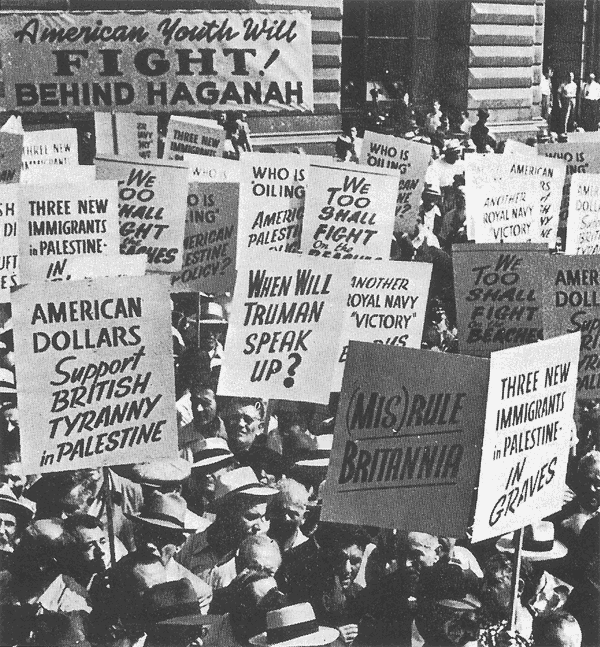
Zionist rally in New York City, 1947
The Jewish Agency demanded that Britain grant one hundred thousand immigration certificates for European Jews to go to Palestine. Bricha, the organization responsible for illegal immigration to Palestine, sent organizers into the Displaced Persons camps. They helped thousands of potential immigrants get to Mediterranean ports for illegal departure to the shores of Palestine aboard rickety ships. Despite the intense campaign, a later report to the American Jewish Congress by a Zionist organizer, Chaplain Klausner, contended that most of the refugees had actually wanted to come to the United States. Klausner concluded, "I am convinced that the people must be forced to go to Palestine."2
Nonetheless, Americans responded to the dramatic attempts of the Zionists to break the British naval blockade of Palestine. The wishes of the refugees were ignored. Grief and shock at the Nazi genocide helped Zionists raise millions of dollars to send to Palestine. In 1946 and 1947 alone, American Zionists sent over $130 million to Palestine.3 Editorials in American papers roundly condemned the British and called for the granting of the immigration certificates to the Jewish Agency. In this atmosphere, anyone who spoke out against Zionism was immediately labeled "anti-Semitic."
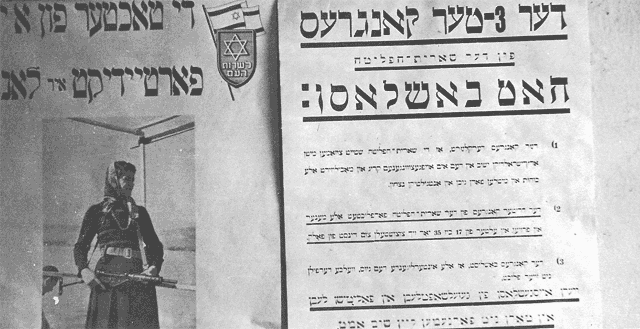 A recruitment poster displayed in Displaced Persons camps in Germany. In Yiddish, the poster says in part: "Men and women between the ages of 17 to 35 should report for duty to the Jewish people. All those of age to be mobilized who do not fulfill their duty will be excluded from the social and political life of the community and prohibited from holding any official office in the DP community.
A recruitment poster displayed in Displaced Persons camps in Germany. In Yiddish, the poster says in part: "Men and women between the ages of 17 to 35 should report for duty to the Jewish people. All those of age to be mobilized who do not fulfill their duty will be excluded from the social and political life of the community and prohibited from holding any official office in the DP community.
In the summer of 1945, Truman wrote British Prime Minister Clement Atlee to support the admission of a hundred thousand immigrants into Palestine. Atlee replied by reminding him of America's promise to consult the Arabs in such matters, adding, "It would be very unwise to break these solemn pledges and so set aflame the whole Middle East."4 On Atlee's urging, an Anglo-American Committee of Inquiry was set up and went to Palestine to study the question of Jewish immigration. The Arab Office in Jerusalem testified that:
- The whole Arab people is unalterably opposed ot the attempt to impose Jewish immigration and settlement upon it, and ultimately to establish a Jewish State in Palestine. Its opposition is based primarily on right. The Arabs of Palestine are descendants of the indigenous inhabitants of the country... and they claim the democratic right of a majority to make its own decision in matters urgent national concern.5
In its report in March 1946, the Committee of Inquiry supported the admission of the one hundred thousand immigrants, but rejected the proposal for a Jewish state and the Zionist principle that all Jews had the right to go to Palestine.6 Britain offered to admit the one hundred thousand if the Zionists would disarm. In June the Zionists responded by blowing up eight road and rail bridges. In July the Irgun, with the consent of the Jewish Agency, placed a high-powered bomb in the British governmental wing of the King David Hotel. Eighty people - Arab, Jewish and British - died.7 Armed clashed flared up between British and Zionist forces, and Palestine moved towards war.
Great Britain, unable to cope with the escalating violence in Palestine or with the growing pressure from the United States, announced back in 1947 that it would take the problem of Palestine to the United Nations. It was almost like announcing an American mandate for Palestine. The United States, with war looming in Palestine, threw the full weight of its support to the Zionists.
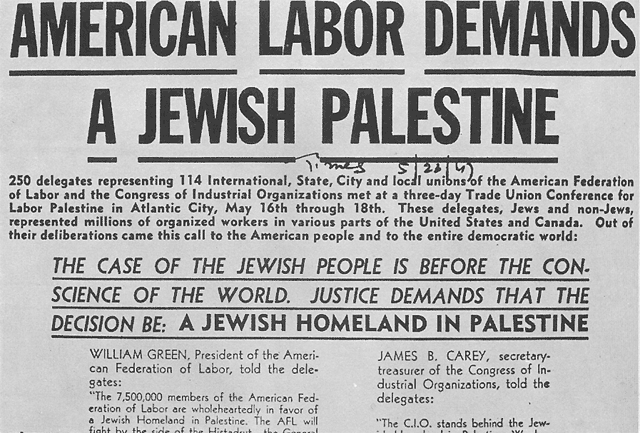 The New York Times, May 23, 1947
The New York Times, May 23, 1947
The United States had taken side, and it dominated the United Nations. Like the countries of Europe, most UN member nations depended heavily on U.S. aid to rebuild their shattered economies in the post-war period. The nineteen Latin American countries were virtual colonies of the United States. American corporations owned much of their economies, and for half a century American Marines and gunships had put down "unrest" and installed friendly governments. On the urging of the United States, some Latin American countries had declared war on Germany in the last days of the war to qualify for admission to the United Nations. There were only four African countries among the fifty-five members of the United Nations; the rest of the countries of Africa were still colonies. In any showdown, the United States could count on a majority of the votes.
The UN Decides
The stage was set for the decision on Palestine. The United Nations Special Commission on Palestine (UNSCOP), which had no African or Arab members, recommended by a narrow margin that Palestine be divided into a Jewish and Arab state. The partition plan granted 55 percent of Palestine to the Jews, who were 30 percent of the population and owned only 6 percent of the land. Some 407,000 Arabs, a number nearly equal to the number of Jews, were to live in the area assigned to the Jewish state. The Arab state was to include ten thousand Jews and 725,000 Arabs in the remaining 45 percent of Palestine.8
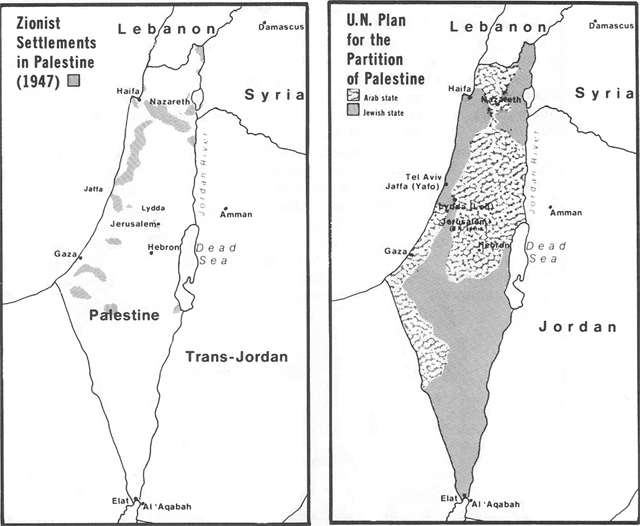
The United States and its allies strongly supported partition. The Soviet Union, after decades of official opposition to Zionism, had changed its position. It wanted to see the British Empire weakened in the Middle East and decided to vote for partition. Whether the Zionists could obtain the two-thirds of the votes necessary for victory depended on the undecided states.
On the opening day of the United Nations session on Palestine, in November 1947, the delegate from the Philippines declared:
- We hold that the issue is primarily moral. The issue is whether the United Nations should accept responsibility for the enforcement of a policy which is clearly repugnant to the valid nationalist aspirations of the people of Palestine. The Philippines Government holds that the United Nations ought not to accept such responsibility.9
Two days later the Philippine delegate was on a ship back to Manila, recalled from his post. A phone call from Washington to President Roxas of the Philippines had reversed the Philippine position on Palestine.10 Ben-Gurion's decision to concentrate on the United States had paid off. In fact, columnist Drew Pearson reported, "President Truman cracked down harder on his State Department than ever before to swing the United Nations vote for the partition of Palestine."11
The example of the Philippine delegate was repeated. The delegate from Siam, who had voted against partition in the United Nations Committee, was also recalled. A telegram signed by twenty-six Senators went to wavering countries. The president of the Firestone Rubber Company cabled Liberia, where it owned extensive rubber plantations, urging Liberia to vote for partition.
Palestine was divided on November 29 by a vote of thirty-three for, thirteen against, and ten abstentions. Only three African and Asian states voted in favor: South Africa, ruled by white European settlers, and Liberia and the Philippines, under pressure from the United States.
As the decision was announced, Arab delegates rose and walked angrily out of the Assembly. The United Nations was dead, one declared. "Not dead," said the Syrian delegate, "murdered." In the next days, Syrian demonstrators attacked the French and American embassies. Fifteen thousand Egyptians poured into the streets of Cairo, fighting the police and stoning the British consulate. Lebanese and Iraqis stormed United States offices. Many Arab people saw the hand of the United States behind the partition plan. A Palestinian leader commented: "We do not recognize Jewish and American illusions about partitioning Palestine. We are fighting an advance guard of America."12
Footnotes
- Joyce and Gabriel Kolko, The Limits of Power (New York: 1972), p. 445.
- Cited by Alfred Lilienthal, What Price Israel? (Chicago: 1953), pp. 194-96.
- Samuel Halpern, The Political World of American Zionism (Detroit: 1961), p. 325.
- Francis Williams, A Prime Minister Remembers:The War and Post-War Memoirs of the Rt. Hon. E. Atlee (London: 1961), pp. 181-201, cited in Khalidi, ed., From Haven to Conquest, p. 565.
- The Arab Case for Palestine:Evidence Submitted by the Arab Office, Jerusalem, to the Anglo-American Committee of Inquiry, March 1946, cited in Walter Laqueur, ed., The Israel-Arab Reader, (New York: 1971), p. 94.
- Ibid., pp. 87-89.
- John and Hadawi, The Palestine Diary, 2:81-83.
- Ibid., pp. 178-80.
- United Nations, General Assembly Plenary Meeting, 2nd Session, November 1947, vol. 5, pp. 1313-14, cited by John and Hadawi, 2:262.
- Alfred Lilienthal, There Goes the Middle East (New York: 1958), p. 6.
- Chicago Daily Tribune, 9 February 1948, 8:1, cited by John and Hadawi, 2:262.
- New York Times, 22 December 1947, 10:1, cited by John and Hadawi, 2:290.